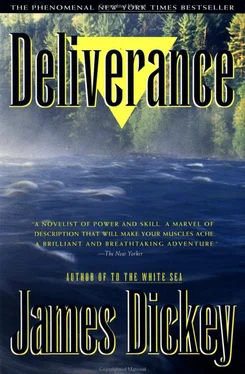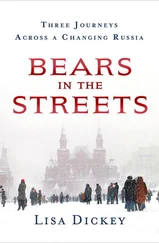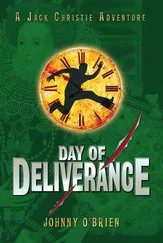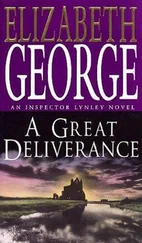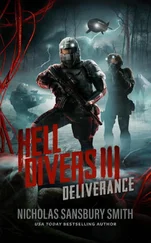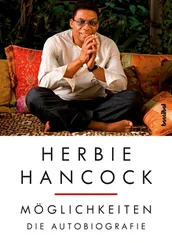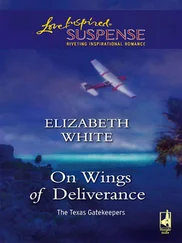Deliverance
by James Dickey
It unrolled slowly, forced to show its colors, curling and snapping back whenever one of us turned loose. The whole land was very tense until we put our four steins on its corners and laid the river out to run for us through the mountains 150 miles north. Lewis’ hand took a pencil and marked out a small strong X in a place where some of the green bled away and the paper changed with high ground, and began to work downstream, northeast to southwest through the printed woods. I watched the hand rather than the location, for it seemed to have power over the terrain, and when it stopped for Lewis’ voice to explain something, it was as though all streams everywhere quit running, hanging silently where they were to let the point be made. The pencil turned over and pretended to sketch in with the eraser an area that must have been around fifty miles long, through which the river hooked and cramped.
“When they take another survey and rework this map,” Lewis said, “all this in here will be blue. The dam at Aintry has already been started, and when it’s finished next spring the river will back up fast. This whole valley will be under water. But right now it’s wild. And I mean wild; it looks like something up in Alaska. We really ought to go up there before the real estate people get hold of it and make it over into one of their heavens.”
I leaned forward and concentrated down into the invisible shape he had drawn, trying to see the changes that would come, the nighttime rising of dammed water bringing a new lake up with its choice lots, its marinas and beer cans, and also trying to visualize the land as Lewis said it was at that moment, unvisited and free. I breathed in and out once, consciously; my body, particularly the back and arms, felt ready for something like this. I looked around the bar and then back into the map, picking up the river where we would enter it. A little way to the southwest the paper blanched.
“Does this mean it’s higher here?” I asked.
“Yes,” Lewis said, looking quickly at me to see if I saw he was being tolerant.
Ah, he’s going to turn this into something, I thought. A lesson. A moral. A life principle. A Way.
“It must run through a gorge or something,” was all he said though. “But we can get through that in a day, easy. And the water should be good, in that part especially.”
I didn’t have much idea what good meant in the way of river water, but for it to seem good to Lewis it would have to meet some very definite standards. The way he went about things was strictly his own; that was mainly what he liked about doing them. He liked particularly to take some extremely specialized and difficult form of sport—usually one he could do by himself—and evolve a personal approach to it which he could then expound. I had been through this with him in flycasting, in archery and weight lifting and spelunking, in all of which he had developed complete mystiques. Now it was canoeing. I settled back and came out of the map.
Bobby Trippe was there, across from me. He had smooth thin hair and a high pink complexion. I knew him least well of the others at the table, but I liked him a good deal, even so. He was pleasantly cynical and gave me the impression that be shared some kind of understanding with me that neither of us was to take Lewis too seriously.
“They tell me that this is the kind of thing that gets hold of middle-class householders every once in a while,” Bobby said. “But most of them just lie down till the feeling passes.”
“And when most of them lie down they’re at Woodlawn before they think about getting up,” Lewis said.
“It’s the old idea that you’re going to get yourself in shape, one of these days, just like you were when you were on the B-team in high school and had to do all those wind sprints. Some few people may jog, once in a while. But who runs sprints? Who goes down rivers?”
“Well, you’ve got a chance to go down one,” Lewis said. “The chance is coming up this weekend, if you can get Friday off. Either Ed and I will go, or we all four can go. But you have to let me know right now, so I can get the other canoe.”
I liked Lewis; I could feel myself getting caught up again in his capricious and tenacious enthusiasms that had already taken me bow-hunting and varmint-calling with him, and down into a small, miserably cold cave where there was one dead, crystalline frog. Lewis was the only man I knew who could do with his life exactly what he wanted to. He talked continuously of resettling in New Zealand or South Africa or Uruguay, but he had to be near the rental property he had inherited, and I didn’t much think he would ever leave. But in his mind he was always leaving, always going somewhere, always doing something else. These techniques and mystiques had built up in him something that impressed me a good deal, even so. He was not only self-determined; he was determined. He was one of the best tournament archers in the state and, even at the age of thirty-eight or –nine, one of the strongest men I had ever shaken hands with. He lifted weights and shot arrows every day in a special kind of alternating rhythm and as a result was so steady that he could easily hold a sixty-pound bow at full draw for twenty seconds. I once saw him kill a quail with an aluminum target arrow at forty yards, the arrow diving into the back feathers at the last possible instant.
So I usually went with him whenever he asked me. I had a bow that he helped me pick out, and a few tags and odds of secondhand equipment, and it was enjoyable walking in the woods with Lewis, when the weather was good, as it usually is in our part of the South in hunting season. Because it took place in such pleasant country, and because of Lewis, I liked field archery—with its faint promise of one day killing a deer—better than golf. But it was really Lewis. He was the only man I knew determined to get something out of life who had both the means and the will to do it, and it interested me to see how, as an experiment, this turned out.
I was not much on theories, myself. But I had a good feeling about this trip. After so much shooting at paper images of deer, it was exciting to think of encountering a real one.
“How, exactly, do we get to the river in the first place?” Drew Ballinger asked.
“There’s a little nothing town up here, just past the high ground,” Lewis said, “name of Oree. We can put in there and come out in Aintry a couple of days later. If we get on the water late Friday, we can be back here the middle of Sunday afternoon, maybe in time for the last half of the pro game on TV.”
“There’s one thing that bothers me,” Drew said. “We don’t really know what we’re getting into. There’s not one of us knows a damned thing about the woods, or about rivers. The last boat I was in was my father-in-law’s ChrisCraft, up on Lake Bodie. I can’t even row a boat straight, much less paddle my own or anybody else’s canoe. What business have I got up there in those mountains?”
“Listen,” Lewis said, knocking on the air with his foreknuckle, “youll be in more danger on the four-lane going home tonight than you’d ever be on the river. Somebody might jump the divider. Who knows?”
“I mean,” Bobby said, “the whole thing does seem kind of crazy.”
“All right,” Lewis said. “Let me demonstrate. What are you going to be doing this afternoon?”
“Well,” Bobby thought a minute. “Most likely I’ll see a couple of new people about mutual funds. I have to draw up some papers and get them notarized.”
“How about you, Drew?”
“See some more route salesmen. We’re making a cooler count to figure out who’s doing what, and where we’re falling short. We’re trying to find ways to up the cold-bottle sales, the same as always. Sometimes they’re up, sometimes they’re down. Right now they’re down.”
Читать дальше
